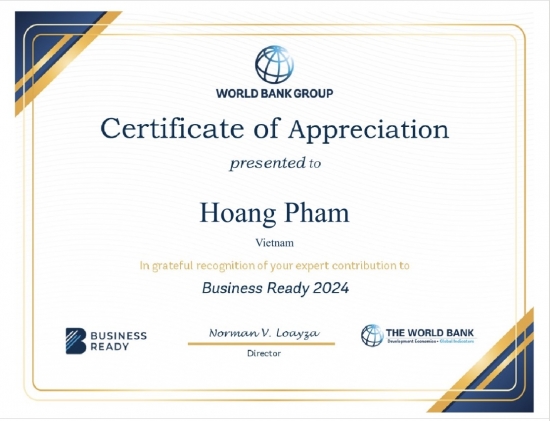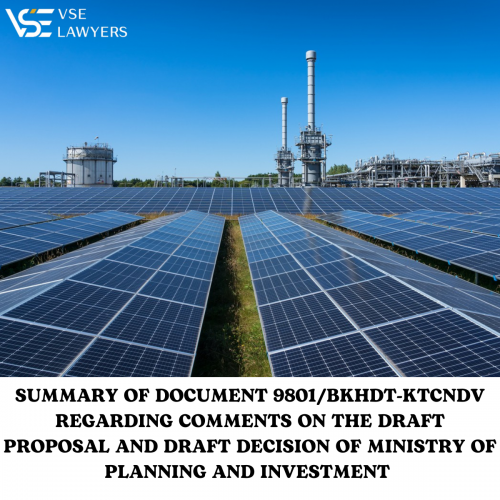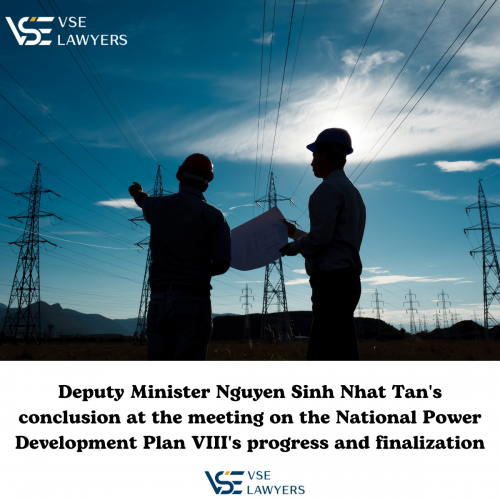SOME RECENT IMPORTANT OFFICIAL DOCUMENTS ON ADJUSTING AND SUPPLEMENTING EXISTING POLICIES TO CREATE MORE FAVORABLE CONDITIONS FOR THE IMPLEMENTATION OF ROOFTOP SOLAR POWER IN VIETNAM.
Vietnam has substantial solar energy potential and a commitment to developing renewable energy sources, particularly solar power, to meet its growing energy demands. However, the deployment of solar power in Vietnam faces several challenges and regulatory ambiguities.
Recent events have emphasized the necessity of adjusting and supplementing existing policies to create more favorable conditions for the implementation of rooftop solar power in Vietnam. Based on some important official documents below to gain a clearer understanding of the challenges and opportunities that the solar power industry is currently facing.
20/09/2023
.png)
INTRODUCTION:
Vietnam has substantial solar energy potential and a commitment to developing renewable energy sources, particularly solar power, to meet its growing energy demands. However, the deployment of solar power in Vietnam faces several challenges and regulatory ambiguities.
Recent events have emphasized the necessity of adjusting and supplementing existing policies to create more favorable conditions for the implementation of rooftop solar power in Vietnam. Based on some important official documents below to gain a clearer understanding of the challenges and opportunities that the solar power industry is currently facing.
I. Official Letter No. 5889/EVNSPC-KD issued by the Southern Power Corporation
On July 17, 2023, the Southern Power Corporation (EVNSPC) issued Official Letter No. 5889/EVNSPC-KD in response to Official Letter No. 29.06/2023/CV_VINASOL dated July 6, 2023, sent to Vinasol Joint Stock Company.
EVNSPC positively evaluated the contributions of Vinasol in renewable energy development, particularly solar power. However, the response letter indicated that there is currently no specific guidance on the installation and connection of self-consumption solar power systems without selling electricity to authorized levels. According to Prime Minister's Decision No. 500/QD-TTg regarding encouraging the development of self-consumption solar power, there are directions to promote such development, but specific implementation guidelines are still lacking. EVNSPC suggested that companies monitor new guidance from the government and ministries to ensure efficient investments and avoid wasting business resources.
II. Official Letter No. 1660/SCT-QLNLKT issued by the Department of Industry and Trade of Quang Nam Province.
On September 14, 2023, the Quang Nam Department of Industry and Trade province issued Official Letter No. 1660/SCT-QLNLKT to Quang Nam Power Company (QNaPC) and individuals and organizations installing rooftop solar power systems. Following the directives of Official Letter No. 5999/UBND-KTN from the Quang Nam Provincial People's Committee and Official Letter No. 5930/BCT-DL from the Ministry of Industry and Trade, they required an inspection and review of rooftop solar installations after 2020. According to the report from QNaPC in Document No. 4827/QNaPC-KD dated September 11, 2023, 14 organizations and individuals installed these systems and self-connected to the electricity grid within the management scope of QNaPC.
Regarding rooftop solar power systems, the Electricity and Renewable Energy Department noted that there are currently no clear regulations on the conditions and procedures for implementing self-consumption solar power systems and energy storage systems. Therefore, they proposed that investors cooperate with the Vietnam Electricity Group and comply with Circular No. 18/2020/TT-BCT from the Ministry of Industry and Trade. While awaiting official guidelines from competent authorities, the Quang Nam Department of Industry and Trade requested individuals and organizations installing rooftop solar power to adhere to legal regulations and perform inspections to ensure the safety of the electrical construction. The Quang Nam Department of Industry and Trade proposed the following requirements and recommendations:
- For individuals and organizations installing rooftop solar power systems after December 31, 2020:
- Do not install systems that are interconnected with the national electricity grid.
- Isolate and disconnect from the national electricity grid for systems that have been installed and operated.
- Take responsibility for installing systems that violate legal regulations (if any).
- For QNaPC:
- Review regulations regarding the rights and obligations of wholesale and retail electricity suppliers, connection agreements, and electricity purchase contracts between customers and the power company to ensure compliance with legal regulations.
- Periodically report to the Quang Nam Department of Industry and Trade on the inspection of electricity usage, safety of electrical constructions, and the electricity grid as required by Circular No. 42/2022/TT-BCT dated December 30, 2022, from the Minister of Industry and Trade regarding the inspection of electricity activities and usage, dispute resolution in electricity purchase contracts.
III. Models and Mechanisms for Rooftop Solar Power Development according to the Ministry of Industry and Trade's Report
Recognizing the existing limitations and challenges in rooftop solar power systems, based on the directions of Deputy Prime Minister Tran Hong Ha and feedback from various ministries, the Ministry of Industry and Trade issued Report No. 160/BC-BCT on September 15, 2023, concerning the mechanism for developing rooftop solar power installations in residential and office buildings in Vietnam.
Regarding the state's policies, the Ministry of Industry and Trade reported the need for breakthroughs to promote renewable energy development, with a priority on rooftop solar power for self-consumption. Furthermore, the current legal framework does not specify the encouraged investment and installation entities for rooftop solar power systems and the legal sanctions for violations. Therefore, there is a need to add a legal framework for these areas.
Some of the recommendations proposed by the Ministry of Industry and Trade for encouraging rooftop solar power development in residential and office buildings are as follows:
- Models connected to the national electricity grid:
Model 1: No electricity sales to other organizations or individuals
- Purpose: Production, consumption, and use of solar power at the location without selling electricity to other organizations or individuals.
- Applicable to: Individuals, technology parks, schools, businesses with small rooftop installations, primarily using electricity during the day.
- Installation: Investors need to calculate and balance resources.
- Advantages: Suitable for solar power generation hours.
- Challenges: Not selling electricity to others may pose difficulties during installation and management.
Model 2: Allows selling electricity to organizations and individuals:
- In addition to the entities covered by Model 1, Model 2 may include additional entities such as selling solar power to industrial zones, export processing zones, factories, etc.
- Advantages: Overcomes the challenges of Model 1, creates business opportunities, but is more complex due to the need to determine electricity prices and agree on pricing frameworks.
- Challenges: Requires electricity pricing policies, agreements between parties based on pricing frameworks, and the management of a large number of transactions and electricity storage due to the involvement of multiple investors.
The Ministry of Industry and Trade is currently researching and developing a Direct Power Purchase Agreement (DPPA) mechanism, but it may only apply to projects with a capacity of over 10 MW and may not be applicable to rooftop solar power.
- Models not connected to the national electricity grid (Model 3):
- Purpose: Production, use, or sale of solar power to organizations and individuals outside of the Vietnam Electricity (EVN) without connecting to the national electricity grid.
- Advantages: Self-supply of electricity, independence from the national electricity grid.
- Challenges: Ensuring stable power supply in case of shortages, dependence on weather conditions, and compliance with safety and environmental requirements. In cases of selling electricity to other organizations and individuals and exceeding the exempted capacity, legal procedures for electricity operation must be followed according to the law.
Note: Investors and projects developed under Model 3 will still be subject to other legal regulations such as investment, construction, environment, fire prevention and fighting, etc.
CONCLUSION:
In conclusion, Vietnam's commitment to harnessing its substantial solar energy potential is undeniable. However, the successful deployment of solar power faces significant challenges and regulatory uncertainties in the country. Recent developments have highlighted the urgent need for policy adjustments and enhancements to facilitate the widespread adoption of rooftop solar systems. Official documents, such as those mentioned, illustrate the complexities of the current landscape. The lack of specific guidelines for rooftop solar installations and the absence of clear regulations have posed obstacles to the solar power industry's growth. To address these challenges and capitalize on the opportunities offered by solar energy, Vietnam's government and relevant authorities are actively considering new mechanisms and legal frameworks. These initiatives aim to encourage the development of solar power systems across diverse models to meet the energy needs of residential and commercial buildings in the country. As Vietnam continues its journey towards a sustainable energy future, it remains essential to strike a balance between regulatory clarity, environmental considerations, and economic viability to unlock the full potential of solar energy in the nation.
----------
For more information, please contact:
Hoang Pham (James) / Managing Partner at: hoang.pham@vselawyers.com
© 2023 VSE LAWYERS LIMITED LIABILITY LAW COMPANY – All rights reserved.
Attention: This legal update is not an advice and should not be treated as such.
Subscribe To Legal Advice from VSE Lawyers
If you would like to have any legal questions, please contact us for our advice


.jpg)

